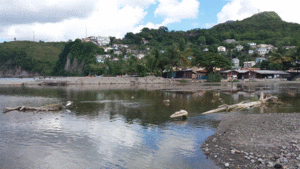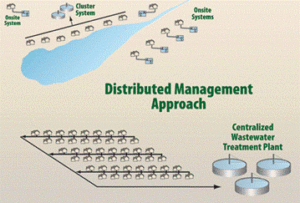Caribbean decentralized wastewater solutions – Island Water Technologies recently presented on key work relating to decentralized wastewater treatment solutions in the Caribbean region.

Wastewater Services in the Caribbean: Currently in the Caribbean, around 85% of untreated wastewater is discharged into seas, rivers and bays. Depending on the territory, such wastewater comes from a mix of oil refineries, sugar factories, domestic sewage, food and beverage processing, and manufacturing operations.
The impact of poorly functioning sewage systems, and the lack of/or improper sewage disposal is causing serious pollution of surface and ground waters.
- 5% of households lack any kind of sewer connections.
- 17% of households are connected to adequate collection and treatment systems. (PAHO (Pan American Health Organization), 2001)
Groundwater: Select countries in the Caribbean region rely heavily on groundwater as their water supply source – Barbados (90%), Jamaica (84%), St. Kitts (70%), and Trinidad (24%). In contrast Grenada, Dominica, and St. Lucia groundwater is hardly utilized, illustrating the variability across the Caribbean (Cashman, 2014).
The Key Barriers to the development of wastewater treatment solutions in the Caribbean region include:
- Financial limitations
- Inadequate regulatory framework and enforcement of existing legislation
- Limited local design, technical and operational capacity
According to UNEP/GPA (2006) the high costs of building and maintaining traditional sewage treatment plants are frequently the reason for not treating sewage before its disposal (Anna-Karin Poussart, 2008).

Risks & Consequences: Generally, raw sewage and partially treated wastewater is discharged into a natural water course or untreated and discharged into open drains ending up on the coast. Poor sewage treatment and disposal can also result in high bacterial levels in coastal areas, affecting the health of the local population and environment.
Potential Solution – Caribbean decentralized wastewater solutions: The work presented by IWT looked to shift focus from costly, centralized wastewater treatment solutions toward a more sustainable, distributed management approach to wastewater.

The work presented by IWT looked at reviewing the benefits of decentralized wastewater treatment solutions and finished up with a summary of continuing work being carried out in Canaries, St. Lucia.


